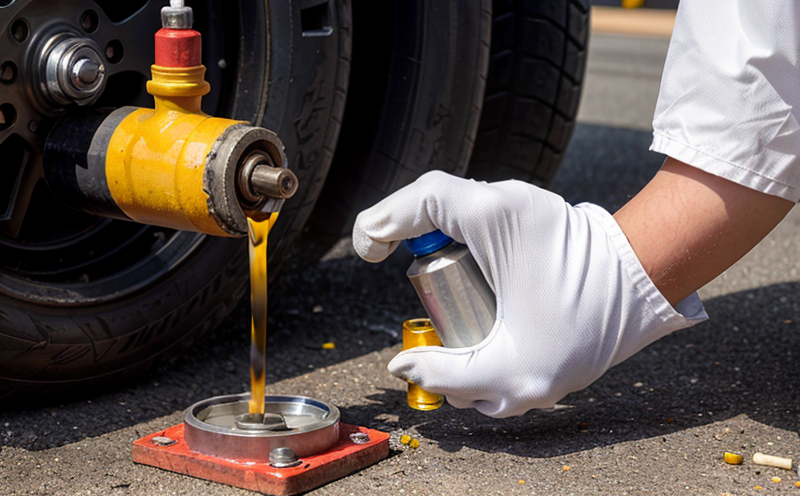ASTM D874 Sulfated Ash Testing of Lubricants
The ASTM D874 standard method is a critical procedure used to determine the amount of sulfur present in lubricating oils and related petroleum products as measured by its oxide content. This test is essential for quality control, compliance with industry standards, and ensuring product performance across various sectors such as marine engineering, automotive manufacturing, and industrial machinery.
The ASTM D874 method involves the combustion of a precisely weighed sample in an oxygen-rich environment at high temperatures to convert all sulfur-containing compounds into sulfur oxides. The resulting ash is then weighed after cooling, which directly correlates with the amount of sulfur present in the original lubricant. This test provides insights into the additive content and the potential impact on equipment lifespan and performance.
Understanding the sulfated ash content is crucial for several reasons:
- Evaluation of additive packages: Sulfated ash content can indicate the level of additives used, which are critical for lubricant performance in high-temperature environments.
- Deterioration assessment: Changes in sulfated ash levels over time can point to degradation or improper storage conditions.
- Comparative analysis: It allows for consistent quality checks and comparisons between different batches or suppliers.
The test is particularly relevant in sectors where lubricants are subjected to extreme operating conditions, such as marine engines and heavy-duty machinery. The results of this test can inform decisions on maintenance schedules, potential equipment failures, and overall operational efficiency.
For accurate ASTM D874 testing, it is essential that the sample preparation be precise and consistent. This includes ensuring a representative sample size and accurately weighing the sample before combustion. Post-combustion, thorough cooling of the residue is necessary to prevent any loss or alteration of the sulfated ash.
The ASTM D874 test is typically performed using an oxygen bomb furnace with controlled conditions for temperature and time. The precision and repeatability of this method make it a standard in the industry.
Understanding the sulfated ash content can significantly impact product development, quality assurance, and customer satisfaction. By adhering to ASTM D874 standards, manufacturers ensure that their products meet stringent quality requirements and comply with international standards such as ISO 12156-1:2019.
Industry Applications
- Marine Engineering: Ensuring lubricants used in marine engines have optimal sulfated ash content to prevent corrosion and enhance engine efficiency.
- Aerospace Industry: Maintaining the integrity of lubricants in aircraft systems where high temperatures and pressures are common.
- Automotive Manufacturing: Quality control for automotive lubricants to ensure they meet stringent performance standards.
- Industrial Machinery: Monitoring lubricant quality in heavy-duty machinery to avoid costly downtime due to component failure.
Why Choose This Test
The ASTM D874 sulfated ash test is chosen for several key reasons:
- Regulatory Compliance: Ensures adherence to industry standards and regulations, which are crucial for maintaining a competitive edge in the global market.
- Quality Assurance: Provides reliable data on additive content and potential degradation of lubricants, helping to maintain consistent product quality.
- Potential Cost Savings: Early detection of issues through this test can prevent costly repairs and replacements by identifying substandard products early in the process.
- Informed Decision-Making: Offers valuable insights into the performance characteristics of lubricants, aiding in strategic product development and marketing decisions.
The precision and reliability of ASTM D874 testing make it a cornerstone for quality assurance programs across various industries. It is particularly useful in sectors where lubricant performance can significantly impact operational efficiency and longevity.
Quality and Reliability Assurance
The ASTM D874 sulfated ash test plays a pivotal role in maintaining the quality and reliability of lubricants. This method ensures that products meet stringent performance standards, which is critical for industries where operational efficiency and equipment longevity are paramount.
By adhering to this standard, manufacturers can:
- Evaluate the effectiveness of additives used in their formulations.
- Monitor potential changes in lubricant composition due to storage or usage conditions.
- Ensure consistency across different batches and suppliers.
The results of ASTM D874 testing are widely accepted and trusted within the industry, providing a benchmark for quality that customers can rely on. This standard also ensures compliance with international regulations such as ISO 12156-1:2019, further enhancing product credibility.
Quality assurance through ASTM D874 testing is not just about meeting regulatory requirements; it's about building trust and ensuring long-term customer satisfaction. By incorporating this test into their quality control processes, manufacturers can ensure that their products perform reliably in demanding environments.





